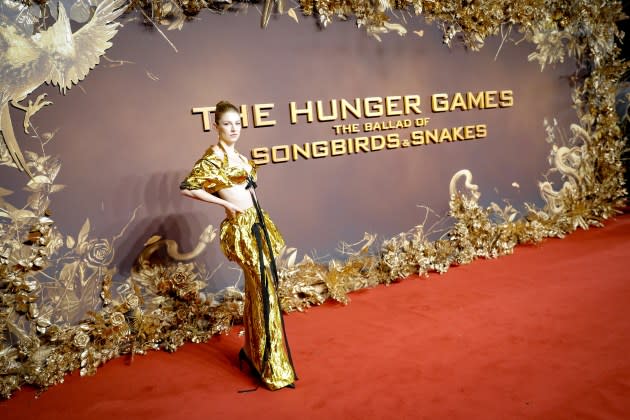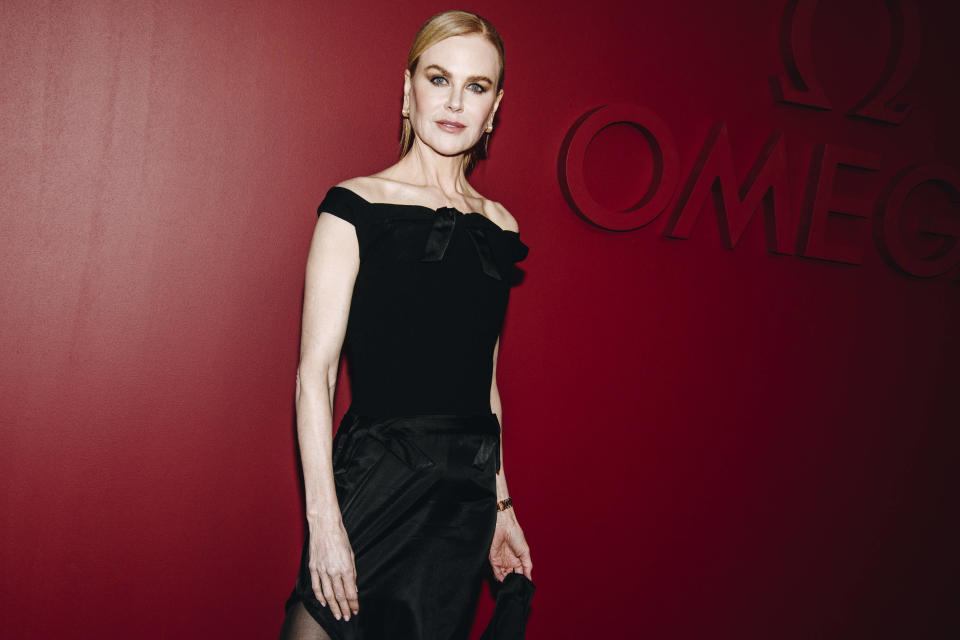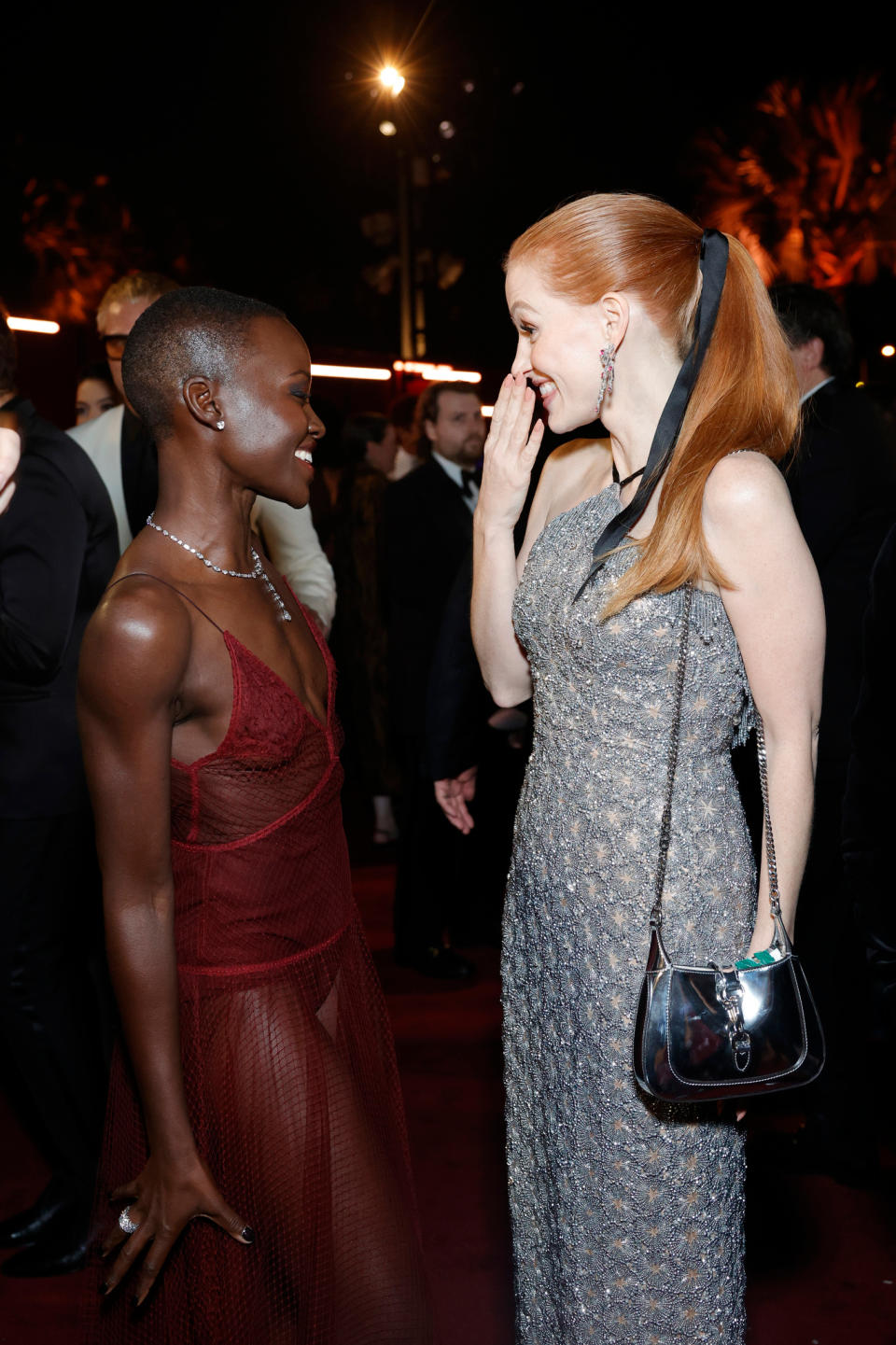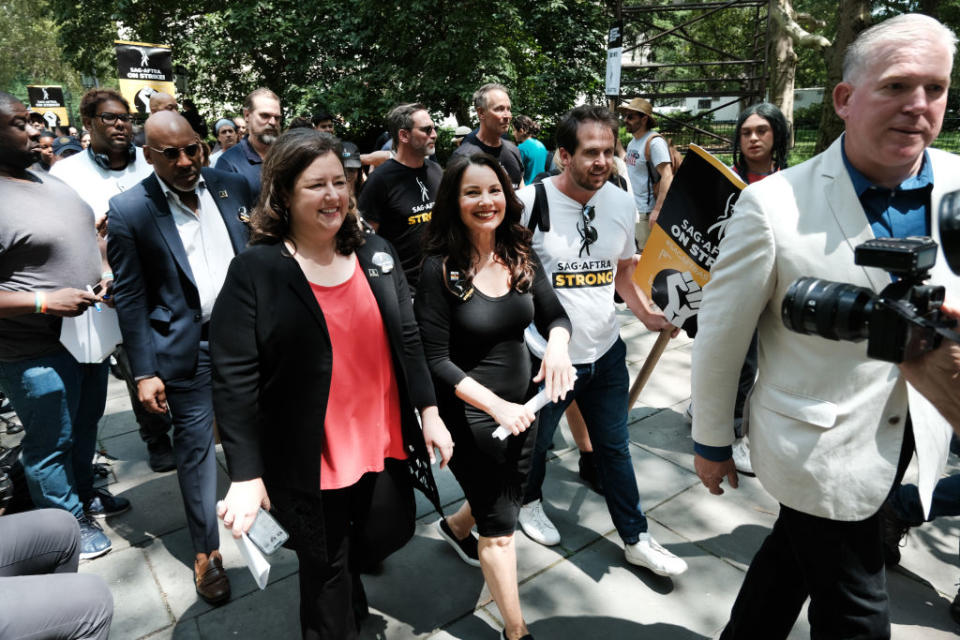Hollywood Glam Teams Are Already Back at Work

On red carpets and glam squads, at industry events and fashion parties, in retail stores and dry cleaners, they are breathing a sigh of relief.
News broke Wednesday night that SAG-AFTRA — the union representing 160,000 American film and television actors as well as announcers, dancers, DJs, puppeteers, recording artists, singers, stunt performers and voiceover artists — reached a tentative deal with the studios to end a tumultuous 118-day strike that coincided with a labor stoppage by Hollywood writers.
More from WWD
Elizabeth Debicki Goes Minimalist in Bottega Veneta One-shoulder Dress at 'The Crown' Premiere
Nicole Kidman Wears Coperni Dress Inspired by Musical Instrument at CMA Awards 2023 Red Carpet
“I’m so proud of what SAG-AFTRA have done. They’ve managed to secure an unprecedented deal, which is fantastic,” Nicole Kidman told WWD at a Planet Omega kick-off event Thursday night in New York. “I’m grateful now that we can move on and get back to work — and get everybody’s dance cards, as I like to say, completely full.”

“Everybody can exhale again,” said Eva Longoria at the Chanel-sponsored Academy Women’s Luncheon on Thursday in Los Angeles, free to talk to reporters again. “Finally,” she went on. “I mean, hallelujah. Finally, let’s go. Let’s f–king go. Let’s get back to work.”
And in London Thursday night, Hunter Schafer brought glamour back to the red carpet, wearing a liquid gold Prada two-piece look to the premiere of “Hunger Games: The Ballad of Songbirds and Snakes,” while her castmates sounded off on the end of the strike: “I already woke up feeling positive and then I saw the news, I was like, ‘Well, this is a great day’,” Tom Blyth, who plays the young Snow in the new film, told Reuters.
The unprecedented turmoil with two of Hollywood’s major unions on picket lines concurrently for the first time in 60 years generated global ripple effects.
It shuttered an industry that generates $186 billion annually in wages, delivering a financial blow to studios, writers and actors, but also to those who depend on Hollywood for their livelihoods.
![Joey King is seen participating in the SAG strike in Los Angeles Ca. After recently hitting up the Taylor Swift show and starring in her new video, Joey king is seen protesting in Los Angeles Ca outside of the Warner bro's studio. 14 Jul 2023 Pictured: Joey King. Photo credit: Snorlax / MEGA TheMegaAgency.com +1 888 505 6342 (Mega Agency TagID: MEGA1007385_001.jpg) [Photo via Mega Agency]](https://s.yimg.com/ny/api/res/1.2/6JE6y_AL.F9nMsIHgl9LEw--/YXBwaWQ9aGlnaGxhbmRlcjt3PTk2MDtoPTE0NDE-/https://media.zenfs.com/en/wwd_409/e26404ba8dafdac248a239077caa3f31)
The actors strike, combined with the Writers Guild strike that ended in September, resulted in the loss of 45,000 jobs, and inflicted an estimated $6 billion in economic damage, according to the Milken Institute, with a trickle-down effect on all kinds of businesses, particularly in Southern California.
“We are in an industry town, and we don’t realize how entrenched the town is until you’ve put it to the test like this and see restaurants folding that have massive backing,” said Rick Rose, co-owner of Roseark, a West Hollywood fine jewelry boutique. “We have friends who are chefs and their restaurants are down 60 percent. And we’re frankly in a similar place. It’s not just the actors, it’s the costumers, the caterers…you run it top to bottom and when that money isn’t flowing through town, we’re all impacted.”
With actors precluded by strike rules from promoting their work, the walkout put a damper on the Venice Film Festival and shuffled dates for Hollywood awards and events.
The Television Academy in August said that the 75th Annual Emmy Awards would be staged in January instead of September. The Oscars, which traditionally air in February or March, are tentatively set for March 10.
Until the strike, Just One Eye, the multiluxury brand store in L.A.’s Sycamore District, had been a go-to-for stylists to pick up current pieces for their clients.
“It was slow for us,” said Renato Alagao, brand partnerships director, of the four month-strike. “Stylists used to be doing full-fledged pulls for press events and the red carpet. During the strike, stylists were pulling more for actors’ personal wardrobe, but they were pulling less expensive items.”
Now that the strike is over, he expects stylists will be returning to the store in full force. “I think we are in a good state now,” he said. “We have holiday coming up and there are a lot of awards shows coming back in the first and second quarter of next year.”
Many Hollywood stylists are already back at work on glam for press tours and awards campaigns.
“The second the strike ended, it was like we’d won the jackpot,” said stylist Karla Welch. “Because we were anticipating, and we have Vanessa Kirby doing ‘Napoleon,’ we had to fit last week. And now we’re in the throes of it. We have Tracee Ellis Ross coming up in ‘American Fiction’ and ‘Candy Cane Lane,’ America Ferrera has ‘Barbie’ and ‘Dumb Money,’ so it’s exciting. But we are also in a war and we’re going to be sensitive to that.”
Brands are excited to get back to the business of celebrity dressing, too. Dolce & Gabbana’s VIP services director Matthew Gebbert posted an Instagram photo of an emptied-out showroom captioning it “strike ending aftermath at the showroom.”
“For me, I wouldn’t make any custom dresses during the strike, but I’m sure we’ll see it again during awards season. I’m happy for SAG-AFTRA, but also for the rest of us who hopefully get to put a bit of sparkle into the world,” said Welch.

While the Gucci-sponsored LACMA Art + Film Gala on Nov. 4 managed to get a very stylish turnout, despite the fact that talent could not talk to press about any projects, the next major fashion red carpet is likely to be the Academy Museum Gala, rescheduled to Dec. 3.
“I think it will be the biggest, best one of the year,” said Welch.
Besides retail stores, glam squads, actors and writers, Hollywood’s below-the-line workers were also affected by the work stoppage, including costume designers who have become increasingly influential in the fashion conversation.
“There are people who lost homes and got evicted, lost their cars. When your whole life revolves around an industry that came to a complete standstill, and you had no control over it, it was devastating, mentally, financially, emotionally,” said costume designer Salvador Pérez, who served as president of the Costume Designers Guild from 2013 to 2022.
“People can finally breathe. And I have to say, the studios must have anticipated this being settled this week, because I have several colleagues whose projects started Monday even though the strike wasn’t officially over. The industry needs content. It’s both ways,” he said. “Not only have our members not made money, but the studios haven’t made money either. They haven’t released TV shows, haven’t released films. This could have been resolved with a big sit-down. I think what frustrates me is, why did it take five months? Why did it take 118 days to come to what they settled in a couple of days?
Details of the deal will be disclosed after the SAG-AFTRA National Board reviews the proposal. But in a letter to membership late Wednesday, union leadership valued the impending pact at more than $1 billion and said it includes participation in streaming profits, a major sticking point; minimum compensation increases; a “substantial” increase in pension and health caps, and provisions stipulating “consent and compensation that will protect members from the threat of AI.”

Union president Fran Drescher emerged as the unyielding public face of the actors’ union, juxtaposing paltry compensation to journeymen performers against the mega-pay packages bestowed on industry executives, including Disney’s Bob Iger and Warner-Bros. Discovery’s David Zaslav. As studio executives issued grave warnings about battered earnings thanks to their headlong push into cash-bleeding streaming services, Drescher chided them as “repugnant” and “tone deaf.”
In a memorable speech announcing the strike last July, Drescher chided the studios for “plead(ing) poverty, that they’re losing money left and right when giving hundreds of millions of dollars to their CEOs. It is disgusting. Shame on them.”
She characterized the agreement as “historic.”
“We did it!!!!” she wrote on her Instagram page. “The Billion+ $ Deal! 3X the last contract! New ground was [broken] everywhere!”
Meanwhile the studios in a statement touted “the biggest contract-on-contract gains in the history of the union, including the largest increase in minimum wages in the last 40 years; a brand new residual for streaming programs; extensive consent and compensation protections in the use of artificial intelligence, and sizable contract increases on items across the board.”
Drescher thanked the studios “for hearing us and meeting this moment.”
Best of WWD


